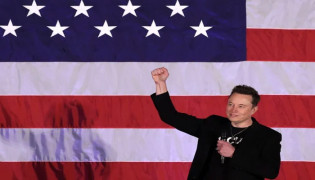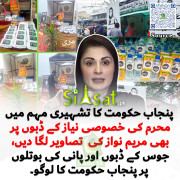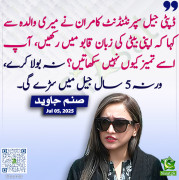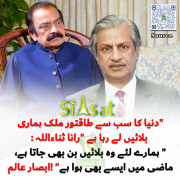QaiserMirza
Chief Minister (5k+ posts)
ETIQUETTES OF EID UL FITR
Ramadhaan is coming to the end and Eid ul Fitr is fast approaching us. I felt it necessary to share with you some information about Eid ul Fitr . Firstly Let me tell me the Sunnats that a Muslim should observe on the day of Eid and then I would warn you of some evils which have spread amongst us during this day.
THE SUNNAHS
1 Doing Ghusl before going out to the prayer.
It was narrated in a saheeh hadeeth in al-Muwatta' and elsewhere that 'Abd-Allaah ibn 'Umar used to do ghusl on the day of al-Fitr before going out to the prayer-place in the morning. Al-Muwatta' 428.
2 Eating before going out to pray on Eid al-Fitr
A hadeeth narrated by al-Bukhaari from Anas ibn Maalik, who said that the Messenger of Allaah (peace and blessings of Allaah be upon him) used not to go out on the morning of Eid al-Fitr until he had eaten some dates of which he would eat an odd number. Al-Bukhaari, 953.
It is mustahabb to eat before going out to emphasize the fact that it is forbidden to fast on that day and to demonstrate that the fast has ended. But on Eid al-Adha it is mustahabb not to eat anything until one comes back from the prayer, so he should eat from the udhiyah if he has offered a sacrifice. If he is not going to offer a sacrifice there is nothing wrong with eating before the prayer.
3- Zakaat al-Fitr is due on this day .
The Prophet (peace and blessings of Allaah be upon him) enjoined that it should be paid before the Eid prayer.
It is permissible to pay it one or two days before that, because of the hadeeth of Ibn 'Umar (may Allaah be pleased with him) which was narrated by al-Bukhaari: "They used to give it one or two days before (Eid) al-Fitr." If it is paid after the Eid prayer, it does not count as Sadaqat al-Fitr, because of the hadeeth of Ibn 'Abbaas: "Whoever pays it before the prayer, it is Zakaat al-Fitr, and whoever pays it after the prayer, it is ordinary charity." It is haraam to delay Zakaat al-Fitr until after the Eid prayer. If one delays it with no excuse then it is not acceptable zakaah, but if there is an excuse such as if a person is traveling and does not have anything to give or anyone to give it to, or he is expecting his family to pay it and they are expecting him to pay it, then in this case he should pay it when it is easy for him to do so, even if that is after the prayer, and there is no sin on him because he has an excuse.
4 Takbeer on the day of Eid
One of the greatest Sunnahs on the day of Eid is saying Takbeer because Allaah says (interpretation of the meaning):
"(He wants that you) must complete the same number (of days), and that you must magnify Allaah [ i.e. to say Takbeer (Allaahu Akbar: Allaah is the Most Great)] for having guided you so that you may be grateful to Him"[al-Baqarah 2:185]
Al-Daaraqutni and others narrated that on the morning of Eid al-Fitr and Eid al-Adha, Ibn 'Umar would strive hard in reciting takbeer until he came to the prayer place, then he would recite takbeer until the imam came out.
Naafi' ibn Jubayr used to recite takbeer and was astonished that the people did not do so, and he said, "Why do you not recite takbeer?"
Description of the takbeer:
Recorded in the Musannaf of Ibn Abi Shaybah with a saheeh isnaad from Ibn Mas'ood (may Allaah be pleased with him) that he used to recite takbeer during the days of tashreeq:
Allaahu akbar, Allaahu akbar, laa ilaaha ill-Allaah, wa Allaahu akbar, Allaah akbar, wa Lillaah il-hamd (Allaah is Most Great, Allaah is most Great, there is no god but Allaah, Allaah is Most great, Allaah is most great, and to Allaah be praise).
5 Offering congratulations
The exchange of congratulations and good wishes by people, such as saying to one another Taqabbala Allaah minna wa minkum (May Allaah accept (good deeds) from us and from you" or "Eid mubaarak" and other permissible expressions of congratulations.
It was narrated that Jubayr ibn Nufayr said: When the companions of the Prophet (peace and blessings of Allaah be upon him) met one another on the day of Eid, they would say to one another, "May Allaah accept (good deeds) from us and from you." Ibn Hajar said, its isnaad is hasan. Al-Fath, 2/446.
The least that may be said concerning the subject of congratulations is that you should return the greetings of those who congratulate you on Eid, and keep quiet if others keep quiet, as Imam Ahmad (may Allaah have mercy on him) said: If anyone congratulates you, then respond, otherwise do not initiate it.
6 Adorning oneself on the occasion of Eid.
'Abd-Allaah ibn 'Umar (may Allaah be pleased with him) said that 'Umar took a brocade cloak that was for sale in the market and brought it to the Messenger of Allaah (peace and blessings of Allaah be upon him), and said, "O Messenger of Allaah, buy this and adorn yourself with it for Eid and for receiving the delegations. " The Messenger of Allaah (peace and blessings of Allaah be upon him) said to him, "Rather this is the dress of one who has no share (of piety or of reward in the Hereafter)" Narrated by al-Bukhaari, 948.
The Prophet (peace and blessings of Allaah be upon him) agreed with 'Umar on the idea of adorning oneself for Eid, but he denounced him for choosing this cloak because it was made of silk.
It was narrated that Jaabir (may Allaah be pleased with him) said: The Prophet (peace and blessings of Allaah be upon him) had a cloak which he would wear on the two Eids and on Fridays. Saheeh Ibn Khuzaymah, 1756,
Al-Bayhaqi narrated with a saheeh isnaad that Ibn 'Umar used to wear his best clothes on Eid.
So a man should wear the best clothes that he has when going out for Eid.
With regard to women, they should avoid adorning themselves when they go out for Eid, because they are forbidden to show off their adornments to non-mahram men. It is also haraam for a woman who wants to go out to put on perfume or to expose men to temptation, because they are only going out for the purpose of worship.
7 Going to the prayer by one route and returning by another.
Jaabir ibn 'Abd-Allaah (may Allaah be pleased with him) said: On the day of Eid, the Prophet (peace and blessings of Allaah be upon him) used to vary his route. Narrated by al-Bukhaari, 986.
It was said that the reason for that was so that the two routes would testify for him on the Day of Resurrection, for the earth will speak on the Day of Resurrection and say what was done on it, both good and bad.
And it was said that it was in order to manifest the symbols of Islam on both routes, or to manifest the remembrance of Allaah (dhikr), or to annoy the hypocrites and Jews, and to scare them with the large number of people who were with him. And it was said that it was in order to attend to the people's needs, to answer their questions, teach them, set an example and give charity to the needy, or to visit his relatives and uphold the ties of kinship.
While celebrating Eid please do take care that you do not violate any rule of Shariah and you do not make Allaah angry on the first day after Ramadhaan.
THINGS TO BE TAKEN CARE OF DURING EID
1. People Leaving/ Missing Prayers - We see a lot of people roaming about in the market whole of the night before Eid and as a result missing out the Fajr Prayer in the morning Please note that our beloved Prophet (peace and blessings of Allaah be upon him) said: "The covenant that stands between us and them is the prayer; whoever forsakes it is a kaafir." Narrated by al-Tirmidhi,
And he said: "The most burdensome prayers for the hypocrites are the 'Isha' and Fajr prayers. If they knew (what goodness) there is in them, they would come to them even if they had to crawl. I had thought of ordering the call to prayer to be given, then I would tell a man to lead the people in prayer, then I would go, taking some men with me carrying bundles of wood, to people who do not attend the prayer, and would burn their houses down around them." Narrated by Muslim, 651.
2. Women Mixing with Men The gravest problem during Eid is the mix up of men and women going out wearing perfume and makeup, and without veils. This is a source of great fitnah (temptation) and serious danger. Both women and men should be warned against that, and the necessary means should be taken to prevent that as much as possible. This is a problem which is widespread, and many people take this matter lightly. Some women may Allaah guide them even dress up in their finest clothes and put on the best perfume when they go to the mosque to pray Taraaweeh or go to the Eid prayers, etc. The Prophet (peace and blessings of Allaah be upon him) said: "Any woman who puts on perfume and passes by people so that they can smell her fragrance, is an adulteress ." Narrated by al-Nasaa'i, 5126
It was narrated that Abu Hurayrah (may Allaah be pleased with him) said: The Messenger of Allaah (peace and blessings of Allaah be upon him) said: "There are two types of the people of Hell whom I have not seen. People with whips like the tails of cattle with which they beat the people, and women who are clothed yet naked, going astray and leading others astray, with their heads looking like the humps of camels, leaning to one side. They will not enter Paradise nor even smell its fragrance, although its fragrance may be detected from such and such a distance." Narrated by Muslim, 2128.
The guardians of women must fear Allaah with regard to those who are under their care, and fulfil the duty of protecting and maintaining that Allaah has enjoined upon them, because,
"Men are the protectors and maintainers of women, because Allaah has made one of them to excel the other"[al-Nisa' 4:34 interpretation of the meaning]
So they must guide them and show them that which will lead to their salvation and their safety in this world and in the Hereafter, by means of keeping away from that which Allaah has forbidden and striving for that which will bring them closer to Allaah.
3 Listening to singing and haraam things.
One of the Satanic things that are widespread in these times is music and singing. They have become very widespread and people take this matter lightly. It is on TV and radio, in cars, homes and marketplaces. There is no power and no strength except with Allaah. Even cell phones are not free of this evil. There are companies which compete in putting the latest music on the ringers of their cell phones, and in this way music has even reached the mosques, may Allaah protect us This is a great problem and a great evil whereby music is heard in the houses of Allaah. This confirms the words of the Prophet (peace and blessings of Allaah be upon him), "There will be among my ummah people who will regard adultery, silk, alcohol and musical instruments as permissible. " Narrated by al-Bukhaari.
The Muslim has to fear Allaah and realize that the blessing of Allaah means that he is obliged to give thanks to Him. It is not gratitude for the Muslim to disobey his Lord, when He is the One Who has bestowed this blessing upon him.
One of the righteous passed by some people who were engaged in idle entertainment on the day of Eid and said to them, "If you did well in Ramadaan, this is not the way to give thanks for that. If you did badly in Ramadaan, this is not the way that the one who did badly should behave."
May Allaah swt guide us in all our actions
--
"And whoever takes Allah and His apostle and those who believe for a guardian, then surely the party of Allah are they that shall be triumphant."



































